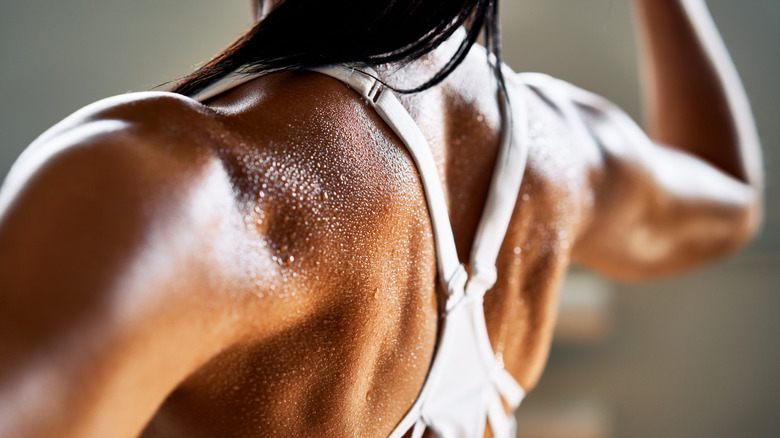How The Skin Regulates Your Body Temperature
Ah, skin. The unsung hero of human anatomy. Sure, Olay has been telling us to love the skin we're in for decades — but what do you really know about this vitally important and largest organ?
This amazing and multifunctional sheath — along with its accessories like nails, hair follicles, and glands — make up the integumentary system, which is responsible for many of the fundamental processes that keep us alive. Skin provides us with protection against hazardous substances, viruses, and infections. It acts as a sensory organ so we know to move away from something that is too hot or put on a jacket if we are too cold (via Healthline). Our skin also prevents the loss of moisture, points to underlying health issues, and produces essential vitamin D.
One of the most important functions of the skin is its ability to regulate body temperature. And the regulation of body temperature goes far above and beyond feeling comfortably cool or warm and cozy. Even a slight shift away from our core temperature of 98.6 degrees can disrupt the rate of metabolic reactions, which provide us with energy and keep our cells functioning (via Princeton).
Your skin keeps your body working
Upon sensing a change, your nervous system knocks on the door of the hypothalamus, the part of the brain that maintains homeostasis, and lets it know whether your body needs to heat up or cool down.
In an effort to keep you warm, your blood vessels will narrow — a process called vasoconstriction – to reduce blood flow and keep your vital organs warm. As Healthline explained, your thyroid gland "releases hormones to increase your metabolism" to warm you. Your body hair will also stand up straight in an attempt to insulate your skin (via Johns Hopkins Medicine. This is known as "goosebumps." While this doesn't work as well now that we aren't covered in thick fur, our bodies remember and are always working to give us the best shot at survival.
If you need to cool down, your nervous system will send out a signal to your sweat glands, which in turn release moisture onto your skin. As the sweat evaporates it pulls heat away from the skin and makes it feel cooler. Your blood vessels will also widen, a process called vasodilatation. "This increases blood flow to your skin where it is cooler — away from your warm inner body," according to Healthline. "This lets your body release heat through heat radiation."
So the next time you pull at your face in the mirror and wish your skin looked brighter or your under-eye bags looked smaller or those pesky pimples would just go away — say thank you instead, because quite honestly, your skin is killing it!


